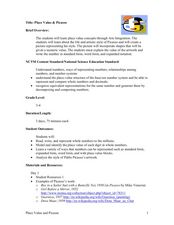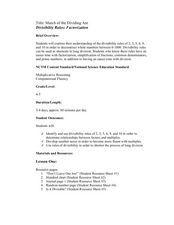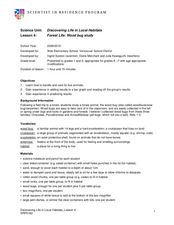Curated OER
Monet and Impressionism
Monet is a great artist to study and impressionism is a wonderful art style to practice. Learners read about Monet then attempt to use impressionist painting techniques. Book and image links are included.
Curated OER
Create a Computer Story
Second graders will create their own story and read it aloud. For this literacy/technology lesson, 2nd graders use computer software to create their own story, which is read back to them while they write it. Afterward, the student should...
Curated OER
Mangrove Ecosystem
Eager ecologists explore ecosystems through video and photographs of a Mangrove. They discuss the animals in this habitat and how they interact with each other after reading and discussing "The Sea, the Storm and the Mangrove Tangle."...
National Security Agency
Let's Party With Place Value
Put on your math caps and explore place value and ways to represent numbers. Learners read, write, and represent whole numbers. They interact with numbers as they read and explore a teacher-created story, play games, and practice their...
Curated OER
Place Value & Picasso
Place value to the millions is the focus of this math instructional activity. Third and fourth graders investigate multiple ways to represent a number. They examine place value while studying factual information about Pablo Picasso....
Curated OER
Time of Slavery
Young historians learn about abolitionists, The Civil War, Frederick Douglas, and so many more details about slavery in this highly engaging presentation. Teachers could use this as a whole class review and discussion tool.
Curated OER
Project Whistlestop:Missouri Vacation Learning Unit
Fourth graders reserach the state of Missouri. In this Missouri History lesson plan, 4th graders plan a vacation to a region of Missouri. Students work in collaborative groups to determine all aspects of the trip. Students use math...
Curated OER
The Empty Pot: A Lesson About Integrity
Learners discuss whether honesty really is the best policy with a lesson on "The Empty Pot," a Chinese fable about integrity. After reading the story, class members answer several comprehension and reflection questions about what...
Curated OER
March of the Dividing Ant
Students inspect divisibility rules. In this divisibility rules lesson, students study the relationship between factorization and the divisibility rules for 2, 3, 5, 6, 9, and 10. Students read One Hundred Hungry Ants and A Remainder of...
Curated OER
Trivia Tag
Students, as chasers, on teachers signal, move throughout a space trying to tag others with their free hand. When a tag is made, both players stop; chaser reads question from card to student who was tagged. If answer is correct, person...
Curated OER
Reading Pattern Books
Students investigate pattern books. In this literature lesson, students read the book Brown Bear, Brown Bear What Do You See? and use echo and choral reading strategies. Students identify the pattern in the text and write about the...
Curated OER
Water Cycle Reading and Writing
After listening to a story about the water cycle, learners create their own versions of this tale. This is a great way to have your class review the concepts of evaporation, condensation, precipitation, and runoff.
Curated OER
Water Cycle Reading and Writing
Here is a great way to get pupils to express a scientific concept in a fun way. After hearing the story of Walter the Water drop and learning facts about the water cycle, the class will write a creative expository piece describing what...
Curated OER
Forest Life- Wood Bug Study
Examine wood bugs and their habitat. Learners gather wood bugs and examine their bodies. Then discuss their body parts and how they help them survive. They also predict where they think wood bugs live to then graph the class results.
Curated OER
Drive the Data Derby
Three days of race car design and driving through the classroom while guessing probability could be a third graders dream. Learn to record car speed, distances traveled, and statistics by using calculation ranges using the mean, median,...
Institute of Electrical and Electronics Engineers
Can You Copperplate?
Introduce emerging engineers to the process of metal plating. This resource provides background reading on chemical engineering, plating, and corrosion. It concludes with a copper plating activity. The standards alignment list includes...
Signing Time Foundation
What is the Water Cycle?
Dive into an exploration of the water cycle cycle with this simple earth science lesson. After first discussing where rain comes from, young scientists define the terms condensation, evaporation, transpiration,...
Curated OER
Linguistic Diversity. Languages in Canada - Elementary
Create a language mosaic to reveal the linguistic diversity in your community. Pupils interview a person with a home language other than English and contribute to a bulletin board display representing the variety of languages spoken. The...
National Science Teachers Association
Hop into Action
Young scientists find out what makes amphibians such unique and interesting animals in this simple life science lesson. After looking at pictures and discussing the characteristics of amphibians, learners complete a series...
Nemours KidsHealth
Water Safety: Grades 6-8
Taking care of younger children is often the first job for many middle schoolers. Learning how to keep themselves and their young charges safe, especially around water, is essential. Two activities teach teens, and tweens water safety...
Curated OER
Destination Reading
Students practice reading skills and comprehension through the use of computers and the educational software "Destination Reading" provided by Riverdeep in this self-directed lesson.
Curated OER
Reciprocal Reading
Students practice their reading comprehension skills by making their own bookmark about the books they have read.
Curated OER
Finding Your Way
Students work in small groups to practice basic map skills. They take turns giving directions and tracing a path from one location to different destinations on the map.
Curated OER
Sneetches
Students engage in a lesson that uses guided questions in order to help create cultural awareness among students. The use of gender is considered and the students reflect upon the answers of questions to learn social skills.

























